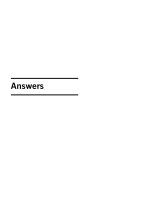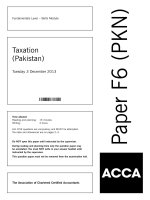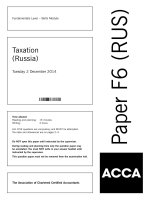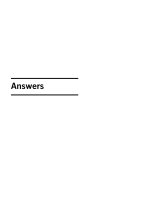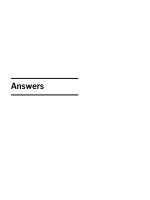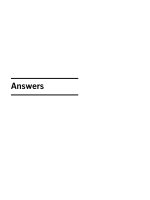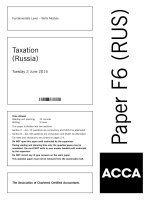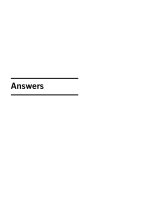ACCA f6 taxation vietnam 2015 dec answer
Bạn đang xem bản rút gọn của tài liệu. Xem và tải ngay bản đầy đủ của tài liệu tại đây (89.17 KB, 8 trang )
Answers
Fundamentals Level – Skills Module, Paper F6 (VNM)
Taxation (Vietnam)
December 2015 Answers
and Marking Scheme
Section A
1
A
VND150 million (600 million/4 years)
Only the original lease allocation per the lease period is allowed – point 2.16 Article 6 of Circular 78/2014.
2
C
The supply of goods for further processing through a bonded warehouse is not subject to foreign contractor tax
(FCT), but the supply of goods for distribution to Vietnam from the bonded warehouse is subject to FCT – as
interpreted from point 5, Article 2 of Circular 103/2014.
3
D
The net foreign exchange gains/losses after offsetting are allocated over a period of up to five years from the project
being put into use – point 2.22, Article 6 of Circular 78/2014.
4
B
Only the input VAT incurred when a tax code has been obtained is deductible – point 3.b, Article 12 of
Circular 103/2014.
5
A
VND0 billion
Collections in advance from customers for which costs are not determinable and 1% provisional tax is paid are
not taxable income in the year of collection – Article 17, point 1 of Circular 78/2014/TT-BTC.
6
B
First tax year: 21 April 2014–20 April 2015: 130 + 64 = 194 days (more than 183 days): resident
Second tax year: 1 January–31 October 2015: 64 + 110 = 174 days (less than 183 days): non-resident
7
C
VND660 million (3 billion * 22%)
The net losses from incentives and other income of VND2 billion cannot be offset with the gains from real estate.
8
C
VND4·2 million (2 million + 22 * 10% + 0)
The taxable revenue when VAT is not separated, as for Invoice 2, must be the whole of the selling price.
9
B
10 A
VND4·67 million [(50 million – (9 million + 3·6 million * 2 + 23 million * (8·5% + 1%))) * 20% –
1·65 million]
VND935,000 [((500 * 3 – 600) * 21,500 – 10,000,000) * 10%]
11 B
12 D
USD15,263 [(250,000 + 40,000)/(1 – 5%) * 5%]
13 C
Point e.1, part 2, Article 26 of Circular 111/2013/TT-BTC.
19
Marks
14 A
(Tax underpaid = VND11 billion – VND8 billion = 3 billion
20% of the final CIT liabilities = VND11 billion * 20% = 2·2 billion
The excess of underpaid tax over 20% = 3 – 2·2 billion = VND0·8 billion)
Where provisional quarterly corporate income tax (CIT) is lower than the finalised CIT liability by 20% or more,
the excess over that 20% is subject to a penalty from the deadline for the tax payment for Quarter IV of the year,
in this case 31 January 2015 – Article 17 of Circular 151/2014 supplementing Article 12a of Circular 156/2013.
15 D
The buyers will be responsible for making a capital gains tax declaration since they are local entities. According
to point 2, Article 16 of Circular 151, HNKV Co is not required to file a corporate income tax (CIT) finalisation at
the time of conversion when it is a conversion from a limited liability company to a joint stock company.
2 marks each
20
–––
30
–––
Section B
1
Marks
INVEX Co
(a)
Availability of CIT incentives for the expansion project
Eligibility
The expansion project should be eligible for CIT incentives because:
–
–
the nature of the company’s activities, i.e. high tech in a high technology zone, qualifies them for
incentives; and
the design capacity of the expansion exceeds 20% of the original design capacity.
2
(as stipulated in point 6 (a), Article 18 of Circular 78/2014)
Determination of taxable income
Since it is impossible to separate the taxable income from the expansion project from those from the original
project, if INVEX Co wishes to apply different incentives for the expansion project, it will have to apportion
the taxable income using the historical costs of the expansion and the total historical costs of the fixed assets
actually used for production.
(b)
2
–––
4
–––
CIT liability in 2014
VND million
Ratio of fixed assets used for production:
–
Expansion investment: 40/100 = 40%
–
Original investment: (100 – 40)/100 = 60%
0·5
0·5
Original project
Taxable income (21 billion – 3 billion) * 60%
Tax rate: 10% * 50% (i.e. 2014 was the first year of 50% tax reduction, after
4 years tax exemption from 2010 – 2013)
Tax liability (10,800 * 5%)
Expansion project
Taxable income (21 billion – 3 billion) * 40%
Tax rate: exempt (expansion treated as a new project, being entitled to tax
exemption for 4 years)
Tax liability
Other income
Tax liability (3 billion * 22%)
1
5%
–––––––
540
1
0·5
7,200
0·5
0%
–––––––
0
1
660
–––––––
1,200
–––––––
Total tax liabilities (540 + 0 + 660)
2
10,800
0·5
0·5
–––
6
–––
10
–––
Mr Nobi Takeshi and Ms Ngoc Le
(a)
Mr Takeshi’s PIT deductions in 2014
VND million
Self-deduction
(9 * 7 full months from January to July 2014)
63·0
Dependant deduction
–
Suneo (3·6 * 4 months from January to April)
14·4
–
Two sons of Ms Ngoc (3·6 * 2 * 6 months, i.e. after marriage from February to July 2014)
43·2
Insurance deduction
–
Compulsory (8 million * 6·5 months from January to 15 July 2014)
52·0
Donation
–
Qualified donation to centre for handicapped children
50·0
Tutorial note: Time apportionment of the self-deduction is not required under point c.1.2, part 1, Article 9,
Circular 111/2013.
21
1·5
1·5
1·5
1·5
1
–––
7
–––
Marks
(b)
Ms Ngoc Le’s tax deductions in 2014
VND million
Self-deduction
(9 * 12 full months from January to December 2014)
Dependant deduction
–
Handicapped sister (3·6 * 12 months)
Insurance deduction
–
Voluntary (capped 1 million/month * 6·5 months from January to 15 July 2014)
108·0
1
43·2
1
6·5
1
–––
3
–––
10
–––
Tutorial note: Only Ms Ngoc Le can claim the deduction for her handicapped sister, as it is stipulated in
point d.4, part 1, Article 9 of Circular 111/2013 that for persons whom the taxpayer directly take care of,
relief/deduction is only available if the person has a blood relationship, i.e.it is not available to in-laws. This
is different to the case of Ms Ngoc’s two sons who fall under the provisions in point d.1, part 1, Article 9 of
Circular 111/2013.
3
TPF Co
(a)
Contracts 1 and 2 foreign contractor tax (FCT) implications
Contract 1: ELPPA Co
Since the price of the products will be fixed and determined by ELPPA Co, ELPPA Co would be subject to
FCT in Vietnam (under point 3, Article 1, Circular 103/2014/TT-BTC).
1
There is no clear stipulation in Circular 103 about the tax rate for the activity, however, the most likely case
would be that the goods are subject to corporate income tax (CIT) of 1% and exempt from value added tax
(VAT).
1
Contract 2: BookMac Co
The contract terms are DDP and the advertising costs will be borne by BookMac Co, so BookMac Co will be
subject to FCT in Vietnam (points 2 and 3, Article 1 of Circular 103/2014).
If no other services are provided by BookMac Co in relation to the laptops (the warranty itself is not a service),
it is likely that the supply would be subject to CIT at 1% and exempt from VAT.
(b)
1
1
–––
4
–––
Contract 3 liability to foreign contractor tax (FCT)
Contract 3: PH Co
PH Co is unlikely to be subject to FCT in Vietnam because:
–
–
(c)
0·5
the contract terms are CIF and the risk to the goods are transferred in Malaysia. There is no service
conducted by PH Co in Vietnam according to the summary; and
the warranty clause itself without any other services in Vietnam would not expose PH Co to FCT in
Vietnam (point 2, Article 2 of Circular 103/2014).
1
0·5
–––
2
–––
Contract 4 foreign contractor tax (FCT) liability in 2014
Contract 4: MBI Co
Licence fee
Training fee (not exempt because
provided online)
Corporate income tax (CIT)
VND million
57·3
(17,200 * 3%/(1 – 10%) * 10%)
(1·5 marks)
33·9
(30,000 * 21·5/(1 – 5%) * 5%)
(1·5 marks)
22
Value added tax (VAT)
VND million
Exempt
(0·5 marks)
35·7
(33·9/(1 – 5%))
(0·5 marks)
2
2
–––
4
–––
10
–––
Marks
4
SCG Co
(a)
Value added tax (VAT)
Transactions
Output VAT
VND million
(1) Input VAT for the construction costs is deductible in full
in the period of receiving invoice (allocation to the
depreciation period of 12 years is not relevant)
(660,000/1·1*10%)
(2) Input VAT for the car is deductible in full because the
invoiced amount after the discount is lower than
VND1,600 million
Invoice price (net VAT): 1,870 * (1 – 6%)/1·1 = 1,598
VAT = 1,598 * 10% = 160
(3) The cash incentive for displaying goods in the
supermarkets and stores is subject to VAT at 10%
(point 1, Article 5, Circular 219/2013, Example 15)
(1,000 * 10%)
(4) SCG Co can charge VAT at 10% on a taxable value of
zero for the helmets given away for free as the
promotion is registered with the authorities (point 5,
Article 7 of Circular 219/2013). The input is creditable
in full (0·22 million/1·1 * 10% * 500)
(5) No VAT output arises in respect of the water issued for
customer/supplier meetings and for processing food and
drinks
A full VAT charge at 10% applies to the water used for
the vacation trip (2,000 * 20% * (4,400/1·1 * 10%))
Input VAT is creditable in full (2,000 * (4,400/1·1 * 10%))
(b)
Input VAT
VND million
60,000
160
100
0
1·5
1·5
1
10
0·16
1·5
1
0·8
0·5
–––
7
–––
Invoicing requirements for Transaction 5
For the water used for meetings, SCG Co is neither required to issue VAT invoices nor to declare this output
VAT on these invoices in its return.
1
For the water used for the processing of foods, SCG Co is neither required to issue VAT invoices nor to charge
VAT (point 4, Article 7 of Circular 219/2013 and point 3 (a) Article 5 of Circular 119/2014).
1
For the water used on the vacation trip by its employees, SCG Co is required to issue VAT invoices as for
normal sales (example 25, point 4, Article 7 of Circular 219/2013).
23
1
–––
3
–––
10
–––
Marks
5
VB Bank
Summary of adjustments for corporate income tax (CIT) for the year ended 31 December 2014
Items
Descriptions
1
Accruals of interest
income receivable
Accruals of interest
expense payable
Special bonuses to
employees
2
3
4
5
6
7
Welfare expenses
Vacation trips for
employees
Sponsorship of the
construction of
houses for the poor
Collection of bad
debt provided for in
the previous year
Proposed
adjustments
(VND
million)
0
0
120,000
0
2,400
2,000
(15,000)
Notes
Interest income is recorded and taxed on an accruals basis.
1
Interest expenses are deductible on an accruals basis.
1
The bonuses are not deductible because they are not stipulated in
any documents (point 2.5 Article 6 of Circular 78.
Note: Point 2.31 as amended in Circular 151 since it is not of
welfare nature).
Total implemented salary fund:
12,000/0·5% = 2,400,000
Cap for welfare (including vacation trip):
2,400,000/12 months = 200,000
Total welfare expenses (vacation + other welfare):
8,000 + 12,000 = 20,000
1
Welfare expenses did not exceed the cap. Thus all welfare
expenses are deductible (except those not supported by proper
documents).
Only the 30% not supported by proper documents is not
deductible (8,000 * 30% = 2,400).
Such sponsorship is deductible in 2014 (point 2.26, Article 6 of
Circular 78). However, the payment in cash in excess of
VND20 million is not deductible (i.e. 10,000 * 20% = 2,000).
The debt was provided for, for accounting purposes, thus when
the debt was collected, it would have been recorded as income in
the accounting profits.
2·5
1·5
1·5
2
However, since the original provision was rejected by the tax
authorities, the income should not be taxed when the debt was
recovered. Thus the income should be deducted from the
accounting profit, not added back.
8
Foreign contractor
tax (FCT) borne for
foreign contractor
2,500
The non-reimbursed expense is not deductible (and should be
added back). Because the contract is silent about which party
will bear the tax, the FCT is the responsibility of the foreign
contractor.
2
The reimbursed amount will have no tax implications, as it is not
income of VB Bank.
9
10
11
Dividends from
subsidiaries and
associates
Foreign exchange
losses
(234,000)
Losses of overseas
branch
600,000
820,000
These are not taxable and thus should be deducted from the
accounting profits.
0·5
The losses are not deductible for tax purposes and must be added
back (the treatment of deducting the losses as the accountant did
would understate the taxable profits by two times).
The losses are not deductible and should be added back since
they are required to be accounted for separately and not offset
with the profits of the bank (point 22, Article 7,
Circular 78/2014).
0·5
1·5
–––
15
–––
24
Marks
6
Ms Dau Nguyen
(a)
Taxable and non-taxable income for the year 2014
Taxable
income
VND million
Income from HRD
Salary (30 * 12 months)
Overtime (180 * 100/150) | (180 * 50/150)
Cash support (taxable in full)
360
120
36
––––
516
––––
Income from ILO
Fixed wage (4 * 9 months)
Lecture fee (0·5 * 32 hours * 9 months)
Non-taxable
income
VND million
60
36
144
––––
180
––––
Compensation from insurer
Total taxable/non-taxable income
696
––––
0·5
1·5
1
1
1·5
550
––––
610
––––
1·5
–––
7
–––
Tutorial notes:
1. The cash support received from HRD is taxable because it was not used for the hospital expenses,
according to point g.1.2, part 2, Article 2 of Circular 111/2013).
2. The compensation from the insurer, for both hospital and non-hospital expenses, is not taxable
according to point n.1, part 1, Article 3 of Circular 111/2013.
(b)
PIT liability for the year 2014
Monthly taxable income
(516/12 months)
(180/9 months)
Self-deduction (VND9 million)
Dependant deduction
(VND3·6 million* 3 persons, including daughters and husband)
Compulsory insurance [VND23 million * (8% + 1·5% + 1%)]
Monthly assessable income [43 – (9 + 10·8 + 2·4)]
Monthly gross-up income [(20·8 – 1·65)/0·8]
[(20 – 1·65)/0·8]
From HRD
VND million
43
From ILO
VND million
20
(9)
(10·8)
(2·4)
––––––
20·8
–––––
23·9
0·5
0·5
0·5
1
1·5
20
–––––
0·5
0·5
0·5
22·9
–––––
492·9
–––––
0·5
Monthly assessable income [(492·9/12 months) – (9 + 10·8 + 2·4)]
18·9
1
Annual tax liability
–
(18·9 * 20% – 1·65) * 12 months
25·6
1
–––
8
–––
15
–––
Total assessable income (23·9 *12 months + 22·9 * 9 months)
25
